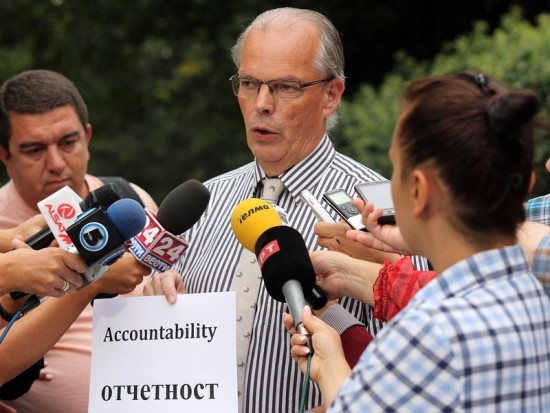Macedonia Parties Clinch Deal on Special Prosecutor
After hours of talks brokered by the EU, Macedonia’s political parties met a Tuesday deadline to agree on the appointment of a special prosecutor who will probe the illegal surveillance claims that have shaken the government.
The EU facilitator in the talks, Peter Vanhoutte has called Macedonian politicians on accountablilty
After marathon talks, Macedonia’s political parties have finally agreed on the appointment of a special prosecutor who will be tasked with investigating the illegal surveillance claims that have rocked the government.
“A deal was reached. We have a prosecutor,” Antonio Milososki, from the negotiating team of the ruling VMRO DPMNE party, tweeted on Tuesday morning.
The decision follows EU-facilitated talks between the government and the opposition that lasted until 5am.
Unnamed sources reported that Katica Janeva, the prosecutor from the southern border town of Gevgelija, will be the new special prosecutor.
According to the agreement, a new law on the special prosecution will go to a vote in parliament Tuesday. Parties have also agreed that the special prosecutor will decide the number and personalities of his or her deputies and staff.
After the law is passed in the parliament, the new prosecutor’s appointment will be verified.
The marathon talks between the government and the opposition held on Sunday and Monday in Skopje were joined by the EU and US ambassadors, Aivo Orav and Jess Baily.
The ruling VMRO DPMNE party of Prime Minister Nikola Gruevski reportedly disputed many of the proposals, concerning the number of deputy prosecutors, the procedures for their appointment, mandates, autonomy and budgets.
The September 15 deadline for the appointment of a special prosecutor was agreed as part of the EU crisis agreement brokered this summer by EU Enlargement Commissioner, Johannes Hahn.
Last Friday, the EU facilitator in the talks, former Belgian MP and expert Peter Vanhoutte, told media that the talks were facing serious difficulties because “one of the largest political parties” now contested the deal and deadlines which it previously accepted in the crisis agreement.
He did not exclude the possibility of more direct EU involvement in determining the special prosecutor should the political parties fail to do so on time.
“The conduct of ‘one of the largest political parties’ is unacceptable,” CIVIL – Centre for Freedom, an NGO, said on Monday, calling for “urgent progress” in the talks and accusing the ruling VMRO DPMNE of stalling it.
This NGO which has been at the forefront of the election monitoring process in Macedonia adds that “it is obvious that the Prime Minister Nikola Gruevski and his party have been breaching the [crisis] agreement right from the beginning.”
A former Macedonian MP, Sulejman Rushiti, said Brussels needed to press hard for a deal.
“I hope that the international factor is aware that the political parties did not sign the [crisis] agreement in order to respect it. I hope that this will bring us to a crossroads where things are solved with international assistance.”
The inter-party talks were supposed to iron out the details about implementing the crisis deal brokered in the summer by Hahn. As part of the deal, the opposition earlier this month returned to parliament, ending a 15-month boycott.
The political crisis in Macedonia revolves around the allegations of mass illegal surveillance.
The opposition Social Democrats say that tapes which they have been releasing since February showed that Prime Minister Gruevski and his cousin, former secret police chief Saso Mijalkov, were behind the illegal surveillance of some 20,000 people, including government ministers.
The tapes appeared to reveal the government’s direct involvement in election fraud and abuse of the justice system and media. They suggested the Prime Minister’s involvement in illegal purchase of construction land among other wrongdoings and also suggested the authorities covered up the murder of a young man by a police officer.
Gruevski, who has been in power since 2006, has insisted that the compromising tapes were “created” by unnamed foreign intelligence services and given to the opposition to destabilise the country.
The crisis agreement also stipulated the appointment of new Interior and Labour ministers from the ranks of the opposition as well as the resignation of Gruevski in mid-December, 100 days before the snap elections set for April.
Other outstanding issues envisaged by the agreement include a revision of the electoral law and measures to ensure unbiased media reporting of the campaign.
Balkan Insight
15 September 2015

